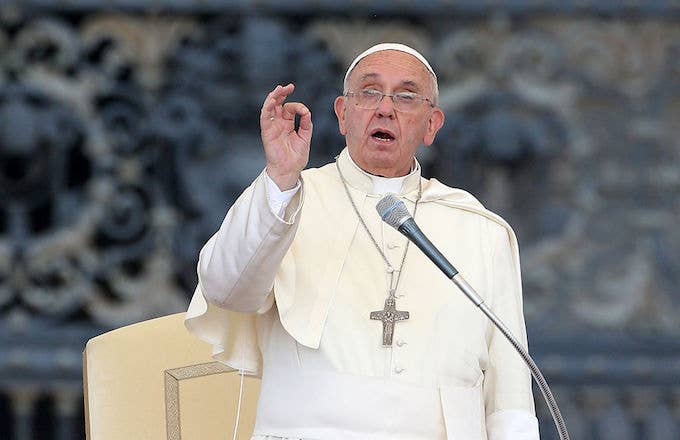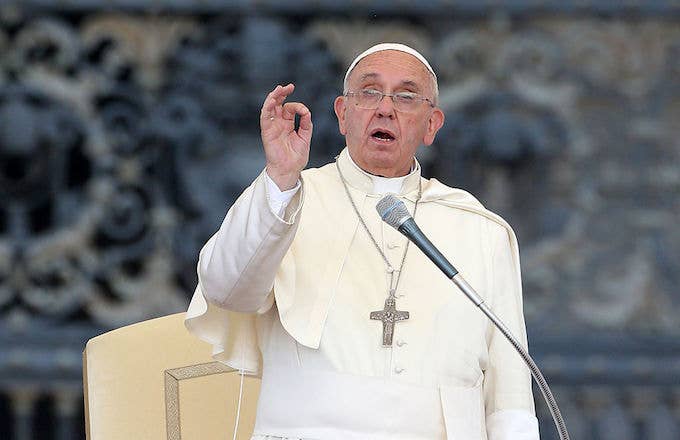
The Pope has one main job: to be the representative of God on Earth (well, you know, the Catholic God, at least). His main duties as an employee are somewhat vague, but he dabbles in some feet washing, some Popemobile riding, some fundraising. One of the biggest parts of the job is giving speeches and making grand, lofty statements.
Apparently it's not enough, because now Pope Francis is angling to become a journalism ethics professor, or at least advise journalists on how to do their job. The Pope gave a speech titled "'The truth will set you free’ (Jn 8:32) Fake news and journalism for peace" on Wednesday at the Vatican for World Communications Day in which he denounced fake news as the literal work of the devil.
There is no such thing as harmless disinformation; trusting in falsehood can have dire consequences.
As he is wont to do, Pope Francis brought out some biblical symbols to make his point. He points out that in Catholicism, the “crafty serpent” is the root of all lies and untruths, and as such the Garden of Eden story has something to teach us about our very modern-day and very real problem with fake news.
The Pope explained that the moment the serpent persuaded Eden to eat the forbidden fruit, the seed of “the tragic history of human sin” was planted. Honestly, this is all pretty standard Catholic stuff. But the Pope went on to make a larger point about disinformation: "This biblical episode brings to light an essential element for our reflection: There is no such thing as harmless disinformation; on the contrary, trusting in falsehood can have dire consequences. Even a seemingly slight distortion of the truth can have dangerous effects."
Pope Francis touched on the nature of journalism in his speech, too. He urged journalists to resist "feeding frenzies and the mad rush for a scoop," saying. "If responsibility is the answer to the spread of fake news, then a weighty responsibility rests on the shoulders of those whose job is to provide information, namely, journalists, the protectors of news.
He then explained what he believes ideal modern journalism would focus on:
"A journalism less concentrated on breaking news than on exploring the underlying causes of conflicts, in order to promote deeper understanding and contribute to their resolution by setting in place virtuous processes. A journalism committed to pointing out alternatives to the escalation of shouting matches and verbal violence."
In addition, sensationalized news is a "grave sin that hurts the heart of the journalist and hurts others."
"You shouldn’t fall into the ‘sins of communication’: disinformation, or giving just one side, calumny that is sensationalized, or defamation, looking for things that are old news and have been dealt with and bringing them to light today," the Pope added.
Pope Francis' omments point to a problem that media is still struggling to completely combat. Fake news is hard to define exactly, but it tends to originate from blogs and websites that do not adhere to the generally accepted standards for serious journalism. They can be dangerous pieces of viral content that lead to dire events like Pizzagate or the recent foiled plot to attack CNN headquarters. Unlike what President Trump thinks, just because you disagree with or are in disbelief of something published in the New York Times does not make it fake news; established and responsible journalism sources have rigorous ethics and reporting guidelines and can generally be trusted with facts.

